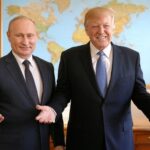Energy News Beat
The bloc has so far imposed 11 packages of restrictions against Moscow over the Ukraine conflict
The European Union is in talks on a new round of sanctions that would impact some €5 billion ($5.3 billion) in trade with Russia, Bloomberg reported on Tuesday, citing its sources.
According to the report, the bloc’s 12th package will tighten restrictions on Moscow’s revenue sources and industry.
People familiar with the matter told the news agency that the new measures could include export restrictions on welding machines, chemicals and technology used for military purposes. The EU is reportedly also considering software license bans and restrictive measures on imports of a small number of processed metals and aluminum products, as well as construction items, transportation-related goods, and diamonds.
The sources suggested that the newly proposed import and export measures on Russia would add up to about €2.5 billion each. The diamond ban is reportedly dependent on a G7 agreement to track and trace the precious stones across borders. The measure is expected to be finalized soon, the sources said.
“The package aims to disrupt Russia’s ability to skirt existing bans through third countries, where it gets access to components, technologies and electronics used in weapons in Ukraine or to manufacture them,” Bloomberg wrote.
READ MORE:
Anti-Russia sanctions have failed – billionaire tycoon
Brussels is looking to add more goods to an existing transit ban and list additional companies in third countries, the sources claimed.
For more stories on economy & finance visit RT’s business section
The post EU looks to expand sanctions on Russia – Bloomberg appeared first on Energy News Beat.







